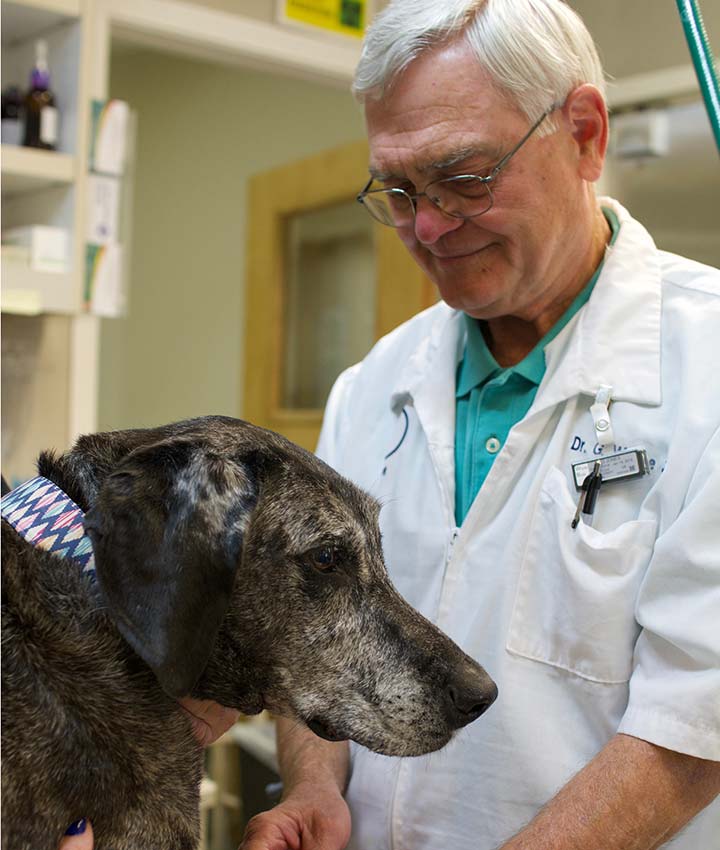

Cryptococcosis* is a fungal disease caused by Cryptococcus neoformans that affects both dogs and humans.There is an increased risk of infection associated with amount of time spent outdoors, a larger roaming space accessed by the dog, and increasing age. According to a study performed in the Tucson and Phoenix area, 28% of dogs will test positive for exposure to the fungus by two years of age, but only 6% of the dogs will be ill with clinical disease. Diagnosis of Valley Fever may include multiple tests, including serology and radiology. Disseminated disease occurs when the fungus has spread outside of the lungs and may include clinical signs such as lameness, pain, seizures, anterior uveitis, and localized swelling. In dogs signs of primary pulmonary disease include a cough, fever, weight loss, anorexia, and lethargy. Coccidioidomycosis* is a fungal disease caused by Coccidioides immitis or Coccidioides posadasii that affects a variety of species, including dogs.The disease in dogs usually affects the lungs and small intestine. Histoplasmosis* is a fungal disease caused by Histoplasma capsulatum that affects both dogs and humans.The disease in dogs can affect the eyes, brain, lungs, skin, or bones. Dogs are ten times more likely to be infected than humans. Blastomycosis* is a fungal disease caused by Blastomyces dermatitidis that affects both dogs and humans.It most commonly occurs in dogs in close confinement such as kennels. Kennel cough is an infectious respiratory disease which can be caused by one of several viruses or by Bordetella bronchiseptica.Clostridium species are a potential cause of diarrhea in dogs.Signs are similar to human disease, including anorexia, fever, and thrombocytopenia. It is caused by Rickettsia rickettsii and spread by ticks of the genus Dermacentor. Rocky Mountain spotted fever* is a rickettsial disease that occurs in dogs and humans.Signs include fever, vasculitis, and low blood counts.

Ehrlichiosis is a disease caused by Ehrlichia canis and spread by the brown dog tick, Rhipicephalus sanguineus.There is no rash as is typically seen in humans. Symptoms in dogs include acute arthritis, anorexia and lethargy. Lyme disease* is a disease caused by Borrelia burgdorferi, a spirochaete, and spread by ticks of the genus Ixodes.Symptoms include liver and kidney failure and vasculitis. Leptospirosis is an infectious disease caused by a spirochaete.Brucellosis is a sexually transmitted bacterial disease that can cause uveitis, abortion, and orchitis in dogs.Canine minute virus is an infectious disease that can cause respiratory and gastrointestinal signs in young puppies.Pseudorabies (Morbus Aujeszky) is an infectious disease that primarily affects swine, but can also cause a fatal disease in dogs with signs similar to rabies.Canine herpesvirus is an infectious disease that is a common cause of death in puppies less than three weeks old.Infectious canine hepatitis is a sometimes fatal infectious disease of the liver.Up to 80 percent of dogs infected will have symptoms, but the mortality rate is only 5 to 8 percent. Canine influenza is a newly emerging infectious respiratory disease.Canine distemper is an often fatal infectious disease that mainly has respiratory and neurological signs.

Canine coronavirus is a gastrointestinal disease that is usually asymptomatic or with mild clinical signs.



 0 kommentar(er)
0 kommentar(er)
